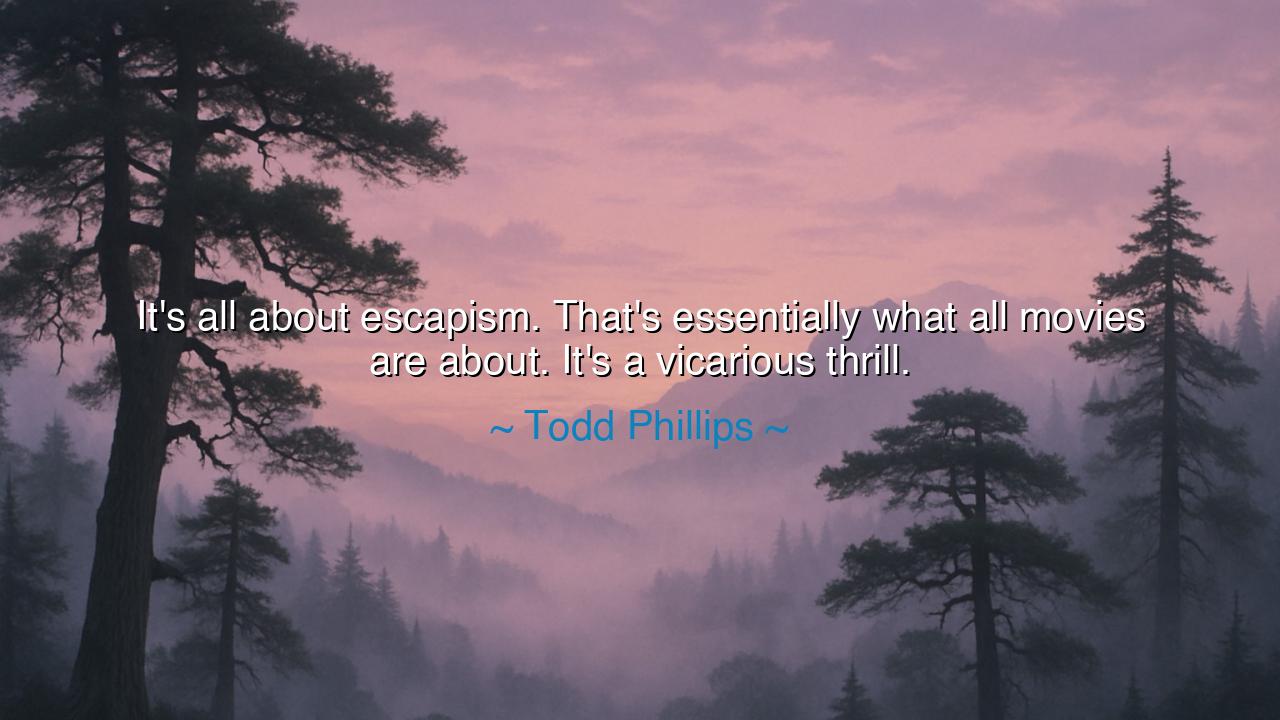
It's all about escapism. That's essentially what all movies are
It's all about escapism. That's essentially what all movies are about. It's a vicarious thrill.






Gather, O seekers of wisdom, and let your hearts be open to the words of Todd Phillips, who speaks of a profound truth that lies at the heart of the cinematic experience: “It’s all about escapism. That’s essentially what all movies are about. It’s a vicarious thrill.” What are these words but a reflection of our deepest desires? The human soul, forever restless, yearns for freedom, for release from the weight of reality, for the freedom to transcend the chains of the mundane world. In the flickering light of the screen, we seek a world that is not bound by the limits of our own lives.
Escapism, dear ones, is the gateway to understanding not only the art of film, but the very nature of the human spirit. From the beginning of time, we have sought ways to transcend the harshness of our existence. Myths, legends, and stories have always been the refuge of weary hearts, offering solace, adventure, and dreams of worlds far beyond the reach of the everyday. It is in these flights of imagination that we have found our most profound truths. The movie, like the ancient tale, is a vessel that carries us from the shores of the known into the vast, mysterious seas of the unknown. It allows us to live lives beyond our own, to experience joy, pain, victory, and defeat, not in our own skin, but through the eyes of others.
In the days of old, the storyteller was the keeper of this escape. Think of the epic of Gilgamesh, where the mighty king sought immortality, only to find that the true power lay in his ability to connect with the world and the people around him. The tale of his journey was not simply a recounting of events—it was an escape into a world where the impossible became possible. Just as Gilgamesh ventured beyond the boundaries of the ordinary, so too do we, the modern seekers, venture into the land of the moving picture, where the impossible dances before our eyes, and the boundaries of our own lives vanish for but a moment.
But let us not mistake the act of escapism for weakness, for it is not a retreat from life’s struggles, but rather a reckoning with them. In the films we watch, we find catharsis—the cleansing of the soul. Escapism allows us to confront our own fears, our desires, our regrets, in a way that is safe, distant, and yet intensely real. Just as the warrior would leave the battlefield and sit by the fire, telling stories of his victories and defeats, we, too, use the flickering images on a screen to confront the battle within our own hearts. The vicarious thrill is the joy of living lives that are not ours, experiencing in a moment what would take years, perhaps even lifetimes, to achieve.
And there are countless stories of those who sought escapism in the form of adventure—stories of the great explorers who ventured into unknown lands, or the revolutionaries who risked their lives for a better world. Consider the legendary Marco Polo, who journeyed across the vast and mysterious lands of Asia. Though his travels were real, in his time, they were nothing less than an act of escapism for those who heard of his stories. The world beyond was a place of mystery and allure, a place where one could escape the confines of the known and taste the sweetness of the unknown.
So, too, do the films that we watch transport us. In every flicker of light on the silver screen, we are granted the gift of another life. And yet, dear ones, it is not enough simply to seek escapism in the fleeting images that pass before our eyes. We must remember that this escape serves a purpose: to return to ourselves transformed, to look upon the world anew, as the ancient heroes did after their own journeys. Escapism is a mirror—one that reflects our own hearts and minds, one that shows us the possibilities of what we might become, what we might achieve, if we dare to step beyond the ordinary.
The lesson is clear: seek not only to escape, but to transform through that escape. When you find yourself in the theater of life, do not merely exist within it—live, dream, and elevate. In your moments of vicarious thrill, let them stir within you the courage to act, to be bold, to face the realities of your own life with the wisdom gained from those fleeting worlds you have entered. The next time you find yourself captivated by a film, or drawn into a story, remember that it is not the escape itself that defines you, but the change it brings about in your soul. Let that vicarious thrill propel you forward, for in the stories of others, you might just find the strength to write your own.
Thus, I say unto you: let escapism be a tool, a means to expand your horizons and transcend your limitations. But always, always return to the world with a heart full of vision, with eyes that have seen the uncharted realms, and with a soul that knows the deeper truths of what it means to be alive. Escapism is not to flee, but to find.






AAdministratorAdministrator
Welcome, honored guests. Please leave a comment, we will respond soon